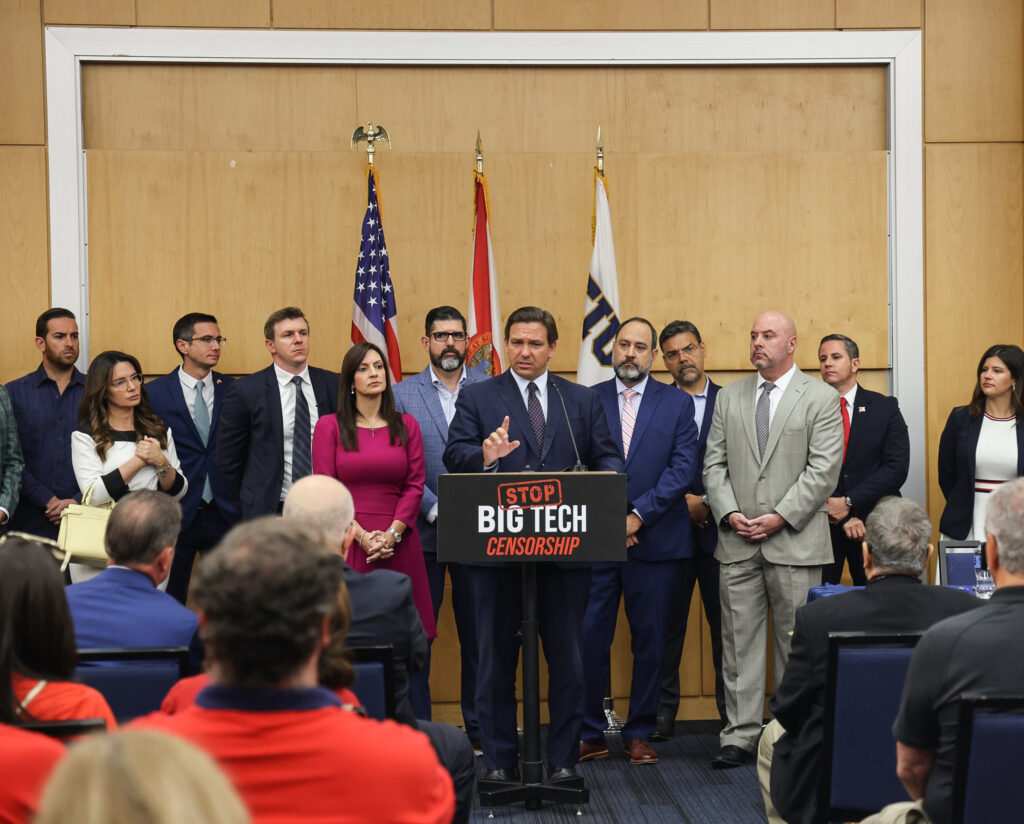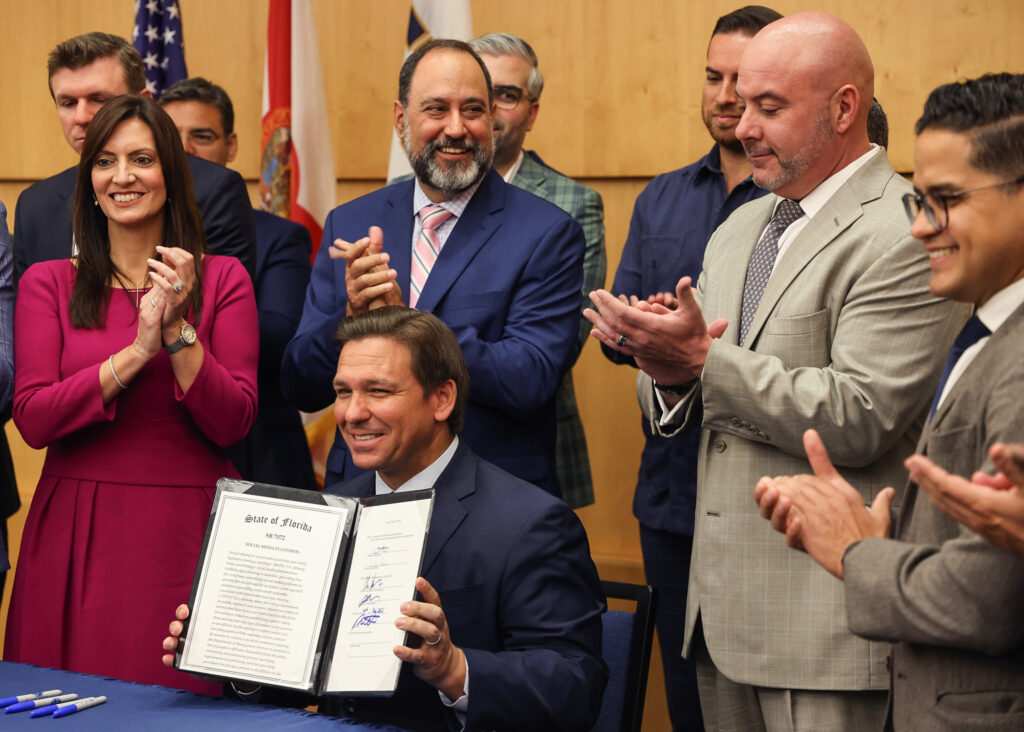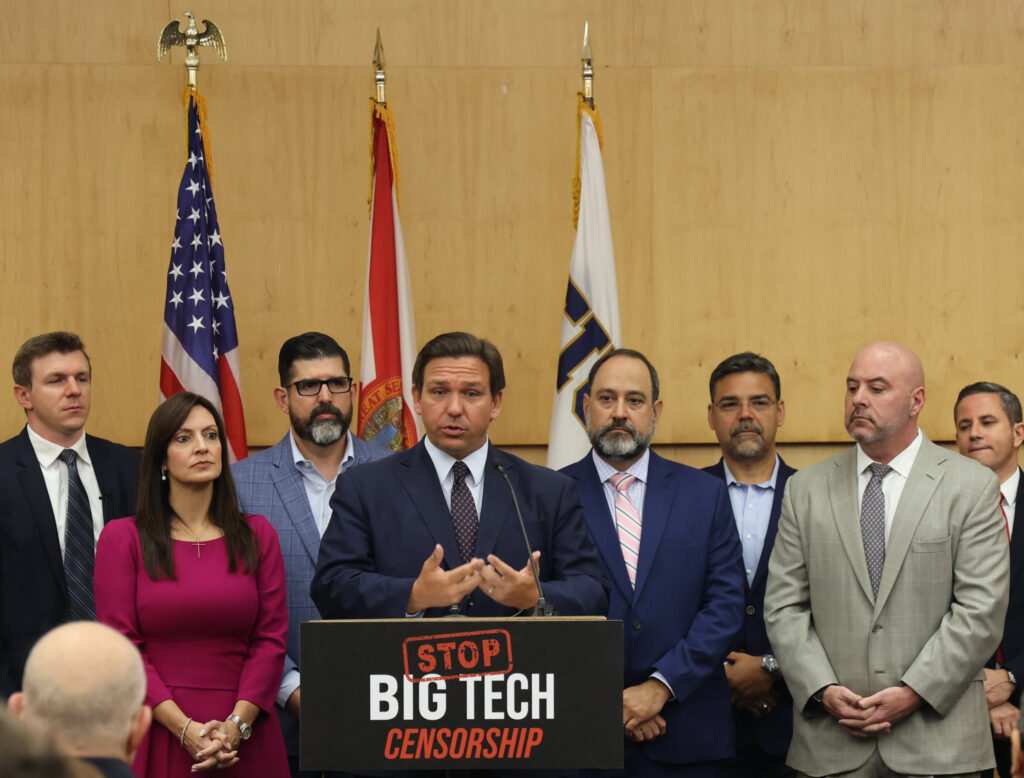Florida Gov. Ron DeSantis, a Republican who is positioning himself for reelection next year, signed legislation on Monday at Florida International University in Miami that aims to crack down on social media platforms like Facebook, Twitter and Amazon out of concern that they are conspiring against conservatives and their free speech.
The legislation, which DeSantis touted as the first of its kind in the nation, would, among other things, make it illegal for large technology companies to remove candidates for office from their platforms in the run up to an election. It would also make it easier for Florida’s attorney general and individuals to sue “Big Tech.”

“These platforms have become our public square,” DeSantis said at a lectern with a sign that read “STOP Big Tech Censorship,” noting that “big tech oligarchs” have censored debates about the pandemic and policies that officials put in place to contain the deadly virus, such as lockdowns. “Silicon Valley is acting as a council of censors; they cancel people when mobs come after somebody. They will pull them down.”
But the measure, which takes effect July 1, is likely to get challenged in court. Critics of the bill, such as Republican Sen, Jeff Brandes, R-St. Petersburg, have argued the legislation would compel speech onto private companies, violating the company’s First Amendment rights. It’s also legally unclear the extent to which Florida can regulate the efforts of companies which operate across state lines.
The governor made the issue a top priority during this year’s annual legislative session.

The issue became a national one in January, after several technology companies kicked then-President Donald Trump off of their platforms. In a speech in Texas that month, DeSantis called fighting conservative censorship online “probably the most important legislative issue that we’re going to have to get right this year and next year.”
“This bill is for everyday Floridians,” DeSantis said when asked by reporters if this was meant to help Trump, a Florida resident. “But I do think that’s another issue that has been brought to bear: When you de-platform the president of the United States but you let Ayatollah Khomeini talk about killing Jews, that is off.”
DeSantis kept the “Big Tech” issue in the news throughout the legislative session with multiple appearances on Fox News, and other official events. In April, after YouTube removed a DeSantis panel discussion with health experts for violating the company’s “COVID-19 medical misinformation” policies, DeSantis defiantly held another discussion with the same experts.

DeSantis has also embraced smaller technology companies that have been popular with conservatives. He’s posted videos on Rumble, a video platform that is an alternative to YouTube, and he criticized Amazon’s move to restrict Parler, which has become an alternative to Twitter for conservatives.
When the measure was debated by legislators, Democrats argued the bill was more about national party politics than principle. Sen. Jason Pizzo, a Miami Democrat, suggested the bill would be helpful to DeSantis if he ends up running to be the Republican nominee for president in 2024 if he gets reelected governor in Florida.
“I’m just writing notes down for a speech that’s going to be given in Iowa in a couple of years, not in your district,” Pizzo said last month. “This is not for your constituents.”
Brandes also challenged the intent of the legislation. He pointed out that Amazon removed Parler from its server after it violated its terms of service by allowing users to post comments promoting violence and conspiracies.
Brandes asked the bill sponsor, Sen. Ray Rodrigues, R-Estero, why the state wanted to prevent platforms from taking content down that called for the assassination of “liberal leaders, their activists … and members of the NBA, NFL, MLB, anchors and correspondents.”

Rodrigues said that under the bill, users who post that type of content would have 30 days to continue using the platform before getting kicked off.
That’s because the bill says any user who has been de-platformed would be allowed access to retrieve all of their information and content.
Any platform that removes a candidate without giving them 30 days warning may be fined up to $250,000 per day if those individuals are running for a statewide office and up to $25,000 per day if they are running for any other office. DeSantis said courts may award up to $100,000 in damages for each proven claim.
“We are protecting Floridians’ ability to speak and express their opinions,” DeSantis said Monday. “This will lead to more speech, not less speech because speech that’s inconvenient to the narrative will be protected.”
While DeSantis makes protecting users’ speech on social media a top priority, the governor and legislators have not imposed new rules on companies that collect information from people who download an app or use a website.
Legislators spent much of the regular session on a proposal that would have imposed new disclosure requirement on companies that collect consumers’ data, but the measure died.
And a gaming compact negotiated by DeSantis and the Seminole Tribe of Florida, and ratified by the state Legislature last week also did not contemplate data harvesting in relation to the deal’s mobile sports betting component.
The governor invited several lawmakers to the bill-signing ceremony Monday. Those guests included James O’Keefe, whose organization, Project Veritas, has tried to undermine the credibility of mainstream news outlets by exposing what it says is their bias. In 2017, O’Keefe’s group sent an operative to The Washington Post under false pretenses in an attempt to intentionally plant a false story about Alabama U.S. Senate candidate Roy Moore. The Post figured out the ruse, and reported on Project Veritas’ efforts.
___
© 2021 Miami Herald Distributed by Tribune Content Agency, LLC



